
Last Thursday, the Senate voted 62 to 38 to advance the Trade Promotion Authority (TPA) bill. This is a vital piece of legislation to aid President Obama and Congress’s ongoing push to complete negotiation of the Trans-Pacific Partnership (TPP) trade agreement. This is a multi-lateral trade deal with eleven foreign nations, among them Australia, Japan, and Singapore that began negotiations in 2005. This bill is significant because it will allow us to establish and expand intellectual property protections with countries who currently have weak or non-existent intellectual property laws or fail to prevent theft of U.S. intellectual property.
The bill, however, and the entire trade agreement may fall apart due to maneuvering concerning currency manipulation. A small group of mostly Democrats, especially Elizabeth Warren (D-MASS), are pushing for amendments that will include enforcing punitive trade mechanisms upon countries who are found to be manipulating their currency to gain unfair advantage. This has been a hot topic on the international stage in recent years, especially concerning trade with China (who is not a member of the Trans-Pacific Partnership) and Japan, which some suspect is trying to devalue the yen. However, there is widespread belief that the other parties in the TPP will not consent to any enforcement measures. The White House has even threatened a veto of TPA if the amendments are included in the final version of the bill.
Why would the White House go so far as to threaten to kill a bill that has had strong bipartisan support? Everyone agrees that currency manipulation is an issue that needs to be addressed to protect America’s strength in foreign trade. But at the cost of torpedoing a major trade agreement almost a decade in the making, it’s simply not worth making our stand here. The most significant part of TPP is that it will bring strong intellectual property protections for American companies to nearly a dozen new countries. The benefits to the American economy will be enormous, likely to the tune of trillions of dollars and millions of jobs.
This deal will do far more for us now than currency manipulation penalties will. The other signatories to the trade agreement also have a significant interest in the passage of the current TPA. This is not because suspected currency manipulation will be allowed to continue, but because this will further open foreign markets to U.S. companies. Those already in the Pacific will have mechanics to increase the scale of their operations, while countless new companies, secured by the TPP’s intellectual property protections, will make first forays into the region. This deal will give members like Malaysia and Peru unprecedented access to the American market. The benefits to our own and the global economy are clear. The choice Congress faces in finalizing this bill is between forcing measures that will either cause TPA to be vetoed or bring the Trans-Pacific Partnership to a grinding halt if the President does sign it, or going forward with TPA as it now stands and seeing to fruition a trade deal that will bring trillions into the U.S. economy and into the pockets of American companies and workers. Does that really sound like a tough choice to make?

